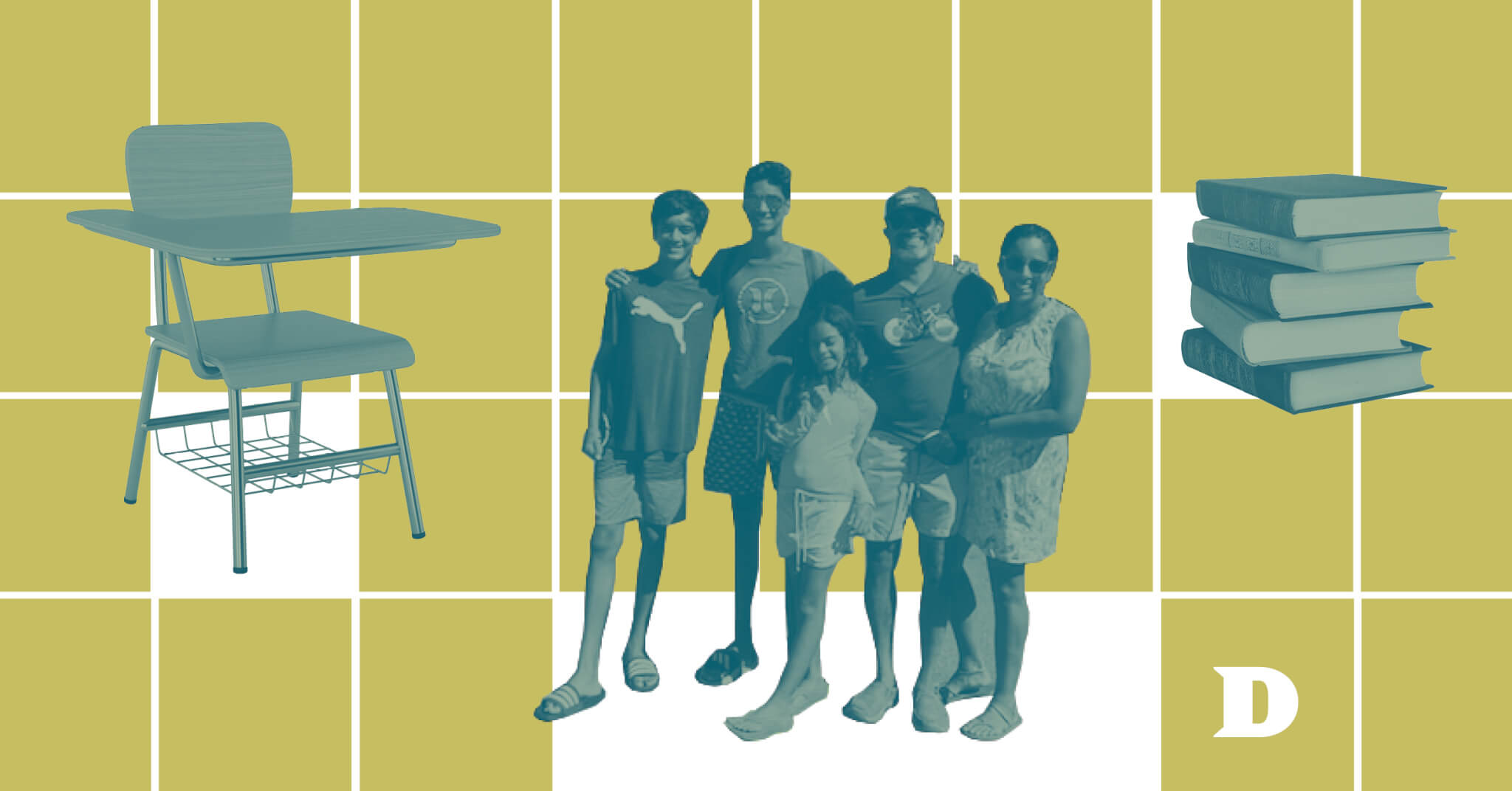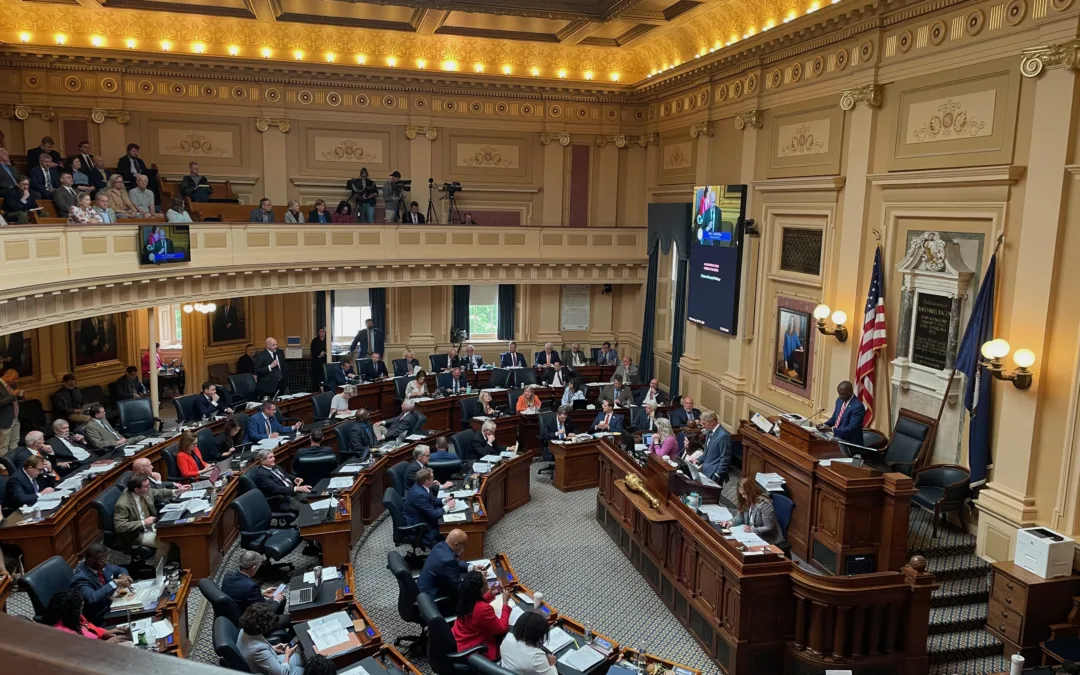
A wealthy private equity baron who built his wealth by investing in companies that outsourced jobs and laid off workers, Republican Glenn Youngkin’s tax plans could take money away from Virginia public schools.
This is the first of a three-part series examining the education agendas of Virginia’s candidates for governor: Republican Glenn Youngkin and Democrat Terry McAuliffe. Today, we’re looking at Youngkin’s proposed tax changes and how they might affect the state’s public schools.
Like any parent, Rupa Murthy wants the best for her children. While she and her husband are doing everything they can to help prepare their three kids for adulthood, they also realize it takes a village.
For this Richmond family, an important part of that village is Virginia’s public school system.
“I am a daughter of immigrants, so education has always been a priority,” Murthy, 43, told Dogwood. “My parents came to this country educated and were able to make a pretty successful, middle-class lifestyle for our family. Education played a huge part in that.”
Murthy always envisioned sending her children to public schools—after all, she is a product of Virginia’s public education system herself. Her 8-year-old and 13-year-old currently attend schools in the Richmond Public Schools district, and her 15-year-old is a sophomore at Maggie Walker High, a public magnet school and one of Virginia’s 18 governors schools.
“We’ve been in public schools for basically nine years now—since our oldest was in first grade—and we’ve had a really good experience. We’ve been incredibly pleased with the rigor, the amount of education, and the unbelievable passion that our teachers exude for learning.” Murthy said. “And what that really has translated into is a love of learning for our own children, which is really all we hope for.”
While there are disparities in the quality of education from district to district—a problem created by the role that local property taxes and sales taxes play in funding Virginia public schools—Murthy’s positive experiences with the state’s education system are indicative of its overall strength.
Virginia’s public education system is consistently ranked among the best in the nation. In 2021, CNBC ranked Virginia as the second best state for education—a key factor in the commonwealth earning the network’s Top State for Business honor.
Education is “a very big part of a state’s investment in its future,” said Bob Pianta, dean of the University of Virginia School of Education and Human Development. He believes some of Virginia’s economic successes are “directly attributable to the education system in Virginia.”
The strength of Virginia public schools is a source of pride for residents like Murthy, which is why she’s concerned about some of the proposals introduced by Glenn Youngkin, the Republican candidate for governor.
Over the past few months, education has become a hot-button issue in the race between Youngkin and his opponent, Terry McAuliffe. Both candidates want to give teachers pay raises, but beyond that commonality, they diverge dramatically. The differences between their platforms underscore an urgent truth: The outcome of this year’s election could have significant consequences for Virginia’s public school system and its students.
An extraordinarily wealthy private equity baron who built his wealth by investing in companies that outsourced jobs and laid off workers, Youngkin has doubled down on cutting taxes that could take money away from Virginia public schools.
“I just don’t feel like what Youngkin is proposing is going to be beneficial to move our students, our educators forward, but most importantly to move the commonwealth forward,” said James J. Fedderman, president of the Virginia Education Association.
Youngkin’s Tax Proposals Are an ‘Absurd Plan,’ Says Virginia Parent
In April, when he was still competing for the Republican nomination, Youngkin proposed eliminating the state income tax, which provides roughly 72% of the revenue in the state’s general fund each year.
This is the portion of the state budget that the governor and legislature have flexibility over—they can decide how to spend money from the general fund. Much of it goes toward public education.
The state’s “nongeneral funds,” meanwhile, represent most of the state’s multiple streams of revenue, but these dollars are set aside for specific purposes. So if a governor wanted to find a way to slash spending on education, eliminating the personal income tax and subsequently reducing spending via the general fund would be the way to do it.
Youngkin’s proposal to eliminate the state income tax would have decimated the public education system. A study published by Virginia Excels, an education advocacy organization focused on K-12 education, found that the plan would have resulted in the loss of $10 billion in state funding—or 56% of total direct state aid to public education over the current two year budget. It would have also led to the loss of nearly 43,000 educator positions across the state.
Such a proposal would also likely worsen disparities across school districts, according to Pianta. In Virginia, most local school funding comes from property taxes. As a result, per-student spending, teacher pay, and teacher quality vary dramatically by region. This leads to “massive inequities in terms of what local governments can pay,” Pianta said. “The state income tax helps enormously in offsetting those inequities.”
In short: If the state collects less income tax dollars, it has less money to use to smooth out those inequities.
After facing significant backlash, Youngkin walked back that idea in August and introduced his Day One game plan. The plan includes a series of one-time tax cuts totaling $1.8 billion that would siphon a significant chunk from the state’s reserves—which are already committed to other expenses—as well as ongoing tax cuts that would cost $1.4 billion each year as part of Virginia’s annual budget.
Youngkin has also introduced a plan to freeze property tax payments—the primary local funding stream for schools—at current levels, unless a local referendum is held to increase them. This would cause local revenues to decline each year due to inflation, which could affect school funding.
Despite his efforts to slash taxes—and therefore education funding—a Youngkin spokesperson suggested that the Republican’s plan would create the largest education budget in state history. The spokesperson did not respond to follow-up questions regarding that claim.
The McAuliffe campaign, meanwhile, did not mince words about Youngkin’s tax proposals.
“Glenn Youngkin’s aspiration to eliminate the state income tax would not only drive Virginia’s economy into a ditch but would decimate funding for public schools and put Virginia’s economy squarely in the ditch Glenn loves to talk about,” said Renzo Olivari, a McAuliffe spokesperson. “His Trumpian plans would blow a massive hole in our budget and lead to drastic cuts to public education and police.”
Murthy, the Richmond mom, was also wary of any cuts to public education funding.
“Workforce development depends on an educated workforce, and so that is an absurd plan to take further funding away from public schools and our education system that many Virginians rely on,” she said.
The Real Issues: Teacher Pay, Educational Equity, and Achievement Gaps
Virginia currently ranks 26th in the nation in average teacher pay, and while both McAuliffe and Youngkin have pledged to improve teacher salaries, Fedderman believes that the former governor has the stronger platform.
“We must address pay and retention head on,” he said. “The average teacher salary in Virginia is $6,500 below the national average, and Terry’s plan will raise salaries above the national average within four years.”
Studies have shown that better pay is critical to improving teacher retention and reducing turnover, while other research suggests it might also improve teacher quality and reduce dropout rates—steps that could prove critical in addressing educational inequities between students.
While Virginia’s public education system is generally strong, a whole host of racial and socioeconomic disparities exist within it.
The pandemic only exacerbated these racial and socioeconomic achievement gaps. The percentage of Black, Latino, and economically disadvantaged Virginia students who passed their science and math standardized tests dropped by roughly 30 percentage points from 2018-2019 to 2020-2021, compared to only a 15 to 20 percentage point decrease for White and Asian students.
In other words, many Virginia students are being left behind.
While Youngkin has made little direct mention of equity, his campaign spokesperson said the Republican would ensure advanced math is offered to students across the state, work to expand the availability of AP classes, and rewrite Virginia’s accreditation standards—which Youngkin has accused McAuliffe of weakening. In reality, McAuliffe led a bipartisan effort in 2015 to make it easier for schools to gain state accreditation by deemphasizing the role of standardized testing in the process.
Youngkin will also work to reform the state’s special education system, according to his spokesperson, and prioritize construction of new schools while also using $200 million for emergency upgrades and repairs to existing schools.
Fedderman, however, knocked Youngkin’s plan for what it didn’t include.
“Youngkin’s education plan does not make mention of educator recruitment. It doesn’t make mention of educator retention, it doesn’t make mention of professional development and it sure doesn’t talk about diversifying the workforce,” Fedderman said. “As a leader of color, it’s very important that students have an opportunity to have an educator in their school experience that looks like them.”
Currently, 82% of Virginia’s public school teachers are white, compared to only 48% of students, according to the VDOE report.
McAuliffe, on the other hand, has made equity, addressing achievement gaps, and improving teacher diversity, recruitment, and retention key planks of his campaign.
In addition to promising to invest an additional$2 billion a year in education, McAuliffe has also committed to adopting and fully funding the Virginia Board of Education’s 2019 Prescribed Standards of Quality (SOQs), which are intended to promote educational equity, support teacher recruitment and retention, expand hiring of school support staff, and help students and schools achieve the Board’s graduation and accreditation requirements.
McAuliffe’s plan would also invest more in community colleges and technical schools, and cover education costs for students who commit to teaching in a Virginia public school for five years after graduation.
“Investing in education is investing in our future,” McAuliffe wrote in an August tweet.
That future, and particularly those of Virginia’s most vulnerable students, may well depend on what happens come November.
“A lot of kids are kind of marginalized, and communities are marginalized,” Pianta said. “This is a pivotal time, because we’re coming out of the pandemic and at the same time [we’re] attending to how public education can help deal with some of [the] inequities and help advance the entire state’s agenda. It’s a really important set of issues.”
In parts two and three of this series, we’ll dive into Youngkin’s school choice proposals and foray into the culture wars.
Politics

Youngkin, Democrats to start over on budget talks
The Republican governor stood with Democratic leaders in the General Assembly on Wednesday in a bid to ease tensions over their budget debate....

VIDEO: Domestic abuse victims speak out against the gun law bills Gov. Glenn Youngkin vetoed
Senate Bill 47 and House Bill 46 aim to close the loophole that allows offenders to transfer their firearms to someone else instead of relinquishing...
Local News

Virginia verses: Celebrating 5 poetic icons for National Poetry Month
There’s no shortage of great writers when it comes to our commonwealth. From the haunting verses of Edgar Allan Poe, who found solace in Richmond's...

Join the fun: Recapping Family Literacy Night’s storybook adventures
When’s the last time you read a book aloud with a loved one? If it’s difficult to answer that question, then maybe it’s time to dust off that TBR...




